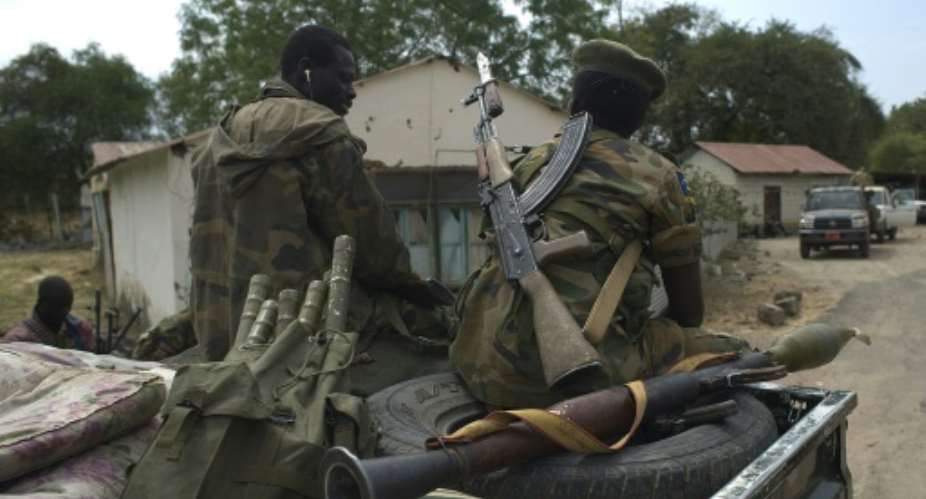Juba (AFP) - South Sudan's army on Tuesday called for international monitors to observe a ceasefire, as it rejected repeated rebel claims of heavy battles in the war-torn country.
Both sides have accused each other of breaking the August 29 ceasefire aimed at ending a brutal 20-month civil war, and the United States has said it is preparing possible new UN sanctions for two more individuals for their role in the continued fighting.
Ceasefire monitors from the regional East Africa bloc IGAD, which led efforts to negotiate the peace deal, are meant to be monitoring the ceasefire, the eighth to have been agreed since war began in December 2013.
But IGAD monitors for now lack the resources to monitor the rival forces, fractured into multiple militia units, with the rebels themselves divided.
"We have asked for monitors from the United States or the United Nations to fill the gap, to observe the ceasefire to stop these accusations," army spokesman Philip Aguer told AFP.
The request for international monitors had been made by the army chief Paul Malong, he added.
The UN mission in South Sudan currently includes over 12,500 military peacekeepers, but spread over a country the size of Spain and Portugal combined, with large areas accessible only by basic roads in the dry season.
- 'Not ready for peace'? -
The world's youngest nation, South Sudan descended into bloodshed in December 2013 when President Salva Kiir accused rebel chief Riek Machar, his former deputy, of planning a coup.
The violence has left tens of thousands of people dead and the impoverished country split along ethnic lines.
Aguer dismissed rebel claims late on Monday that government forces had attacked rebel positions for a fifth day in the battleground northeastern state of Upper Nile as "lies", and said that the army "remains committed to the ceasefire".
But rebel spokesman William Gatjiath Deng claimed helicopter gunships from neighbouring Uganda -- which sent in troops to back government forces, but who under the peace deal, must withdraw by October 10 -- had pounded their positions.
It was not possible to independently verify the reports.
Deng, in a statement released late Monday, also claimed the army launched ground assaults on them, claiming that the reported attacks "clearly demonstrate that (the) Juba regime is not ready for peace."
Aguer said those reports were "just not true", and in turn said the rebels had themselves attacked government forces in the Upper Nile state capital Malakal after the ceasefire signing, but that there had been no fighting in recent days.
Over two million people have fled their homes from a war marked by ethnic killings, gang rapes and forced recruitment of child soldiers.
Some 190,000 terrified civilians are sheltering inside UN bases. The country is also struggling to stamp out a cholera outbreak that has killed at least 46 people.





 Avoid pre-registered SIMs, buyer and seller liable for prosecution – Ursula Owus...
Avoid pre-registered SIMs, buyer and seller liable for prosecution – Ursula Owus...
 Election 2024: Mahama has nothing new to offer Ghanaians, Bawumia is the future ...
Election 2024: Mahama has nothing new to offer Ghanaians, Bawumia is the future ...
 OSP files fresh charges against ex- PPA Boss
OSP files fresh charges against ex- PPA Boss
 Withdraw unreasonable GH¢5.8m fine against former board members – ECG tells PURC
Withdraw unreasonable GH¢5.8m fine against former board members – ECG tells PURC
 Akroma mine attack: Over 20 armed robbers injure workers, steal gold at Esaase
Akroma mine attack: Over 20 armed robbers injure workers, steal gold at Esaase
 Those who understand me have embraced hope for the future — Cheddar
Those who understand me have embraced hope for the future — Cheddar
 Ghana will make maiden voyage into space should Bawumia become President — Chair...
Ghana will make maiden voyage into space should Bawumia become President — Chair...
 Train crash: Despite the sabotage, we shall not be deterred and will persevere —...
Train crash: Despite the sabotage, we shall not be deterred and will persevere —...
 Tema-Mpakadan railway project a perversion of the original viable concept design...
Tema-Mpakadan railway project a perversion of the original viable concept design...
 Train crash: Elsewhere, everyone involved in the test will either be fired or re...
Train crash: Elsewhere, everyone involved in the test will either be fired or re...
